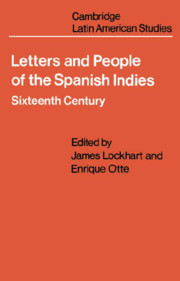Book contents
- Frontmatter
- Contents
- Preface
- Part I Conquest
- Part II The Variety of Life in the Indies
- 11 An encomendero's establishment
- 12 An encomendero's opinions
- 13 The miner
- 14 Commerce across the Atlantic
- 15 The professor of theology
- 16 The new arrival
- 17 The tanner and his wife
- 18 The troubadour
- 19 The nephew
- 20 The garden and the gate
- 21 The woman as settler
- 22 The farmer
- 23 The petty dealer
- 24 The Flemish tailors
- 25 The nobleman
- 26 The Hispanized Indian
- 27 Indian high society
- 28 An Indian town addresses the king
- Part III officials and Clerics
- Bibliography
- Index
13 - The miner
from Part II - The Variety of Life in the Indies
Published online by Cambridge University Press: 06 August 2018
- Frontmatter
- Contents
- Preface
- Part I Conquest
- Part II The Variety of Life in the Indies
- 11 An encomendero's establishment
- 12 An encomendero's opinions
- 13 The miner
- 14 Commerce across the Atlantic
- 15 The professor of theology
- 16 The new arrival
- 17 The tanner and his wife
- 18 The troubadour
- 19 The nephew
- 20 The garden and the gate
- 21 The woman as settler
- 22 The farmer
- 23 The petty dealer
- 24 The Flemish tailors
- 25 The nobleman
- 26 The Hispanized Indian
- 27 Indian high society
- 28 An Indian town addresses the king
- Part III officials and Clerics
- Bibliography
- Index
Summary
Nicolas de Guevara, mining entrepreneur, in Potosi, to Simon Ruiz, merchant, in Medina del Campo, 1595
… I soon came up here to the imperial town of Potosi, where I have lived the whole time, occupying myself in the business of extracting silver …
We have seen that encomiendas dominated the economy of much of the sixteenth-century Spanish American countryside, channeling labor and goods to the cities, as later other types of estates would do. To be complete, to be even tolerable for the Spaniards, the system had to include some way for them to buy iron, cloth, wine, and many other things obtainable only from Europe. Therefore the encomenderos showed a sharp interest in extracting precious metals (as in Letter 11). But placer gold soon ran out in most areas, while silver, though abundant in the central regions, proved to be concentrated in a few rich, longlasting, mainly remotely located sites: in Mexico, at Zacatecas, Guanajuato, and some others; in Peru, at Potosi, the great Cerro Rico or Rich Mountain. There could not be a silver mine on every encomienda. Instead of everyone becoming a miner, the whole Spanish American economy oriented itself towards the mines as the ultimate source of currency. The mines did not become the greatest centers in themselves, being mainly in forbidding places and distant from the densest Indian populations (though Potosi was an impressive town for a time); but Spaniards in all walks of life flourished economically only to the extent that they could sell supplies and services to the mines, or profit from them through extensions of loans or credit, or participate indirectly, selling things in the Spanish cities to others who had closer contact. In some fashion they had to have access to the mine silver that alone would pay for European things.
The Mexican situation is complex because the greatest mines were altogether outside the area of dense sedentary Indian population; the encomienda could not be brought to bear directly. To take the example of Peru and Potosi (belonging to colonial greater Peru though in today's Bolivia), the encomenderos of the whole area from Cuzco south received tribute in silver because their Indians went to work in the mines, and they got yet more silver by selling in Potosi products as unusable by Europeans as chunu and coca, to supply the Indian work force.
- Type
- Chapter
- Information
- Letters and People of the Spanish IndiesSixteenth Century, pp. 83 - 86Publisher: Cambridge University PressPrint publication year: 1976

